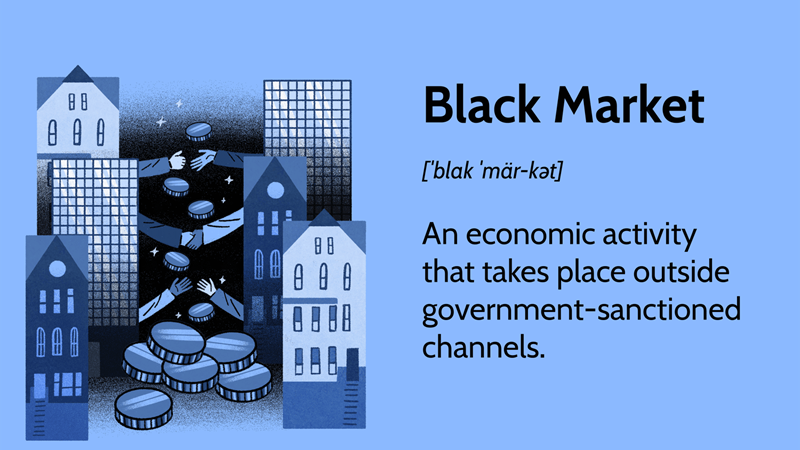The foreign exchange black market operates outside of traditional financial institutions and regulations, allowing individuals and businesses to trade currencies in a decentralized and often unregulated manner. This market is driven by a variety of factors, including economic instability, political uncertainty, and restrictive government policies. In many countries, the black market for foreign exchange serves as a vital lifeline for individuals and businesses seeking to access foreign currency when official channels are limited or unavailable.
While some may view the black market as a necessary evil, others see it as a risky and potentially harmful alternative to official currency exchange systems. Despite the risks and challenges associated with the black market, it continues to thrive in many regions around the world, offering opportunities for profit and access to foreign currency that may not be available through traditional means.
Ultimately, the foreign exchange black market remains a complex and controversial aspect of the global economy, posing challenges for regulators and policymakers seeking to control and monitor currency exchange activities.
Illegal Methods of Obtaining Foreign Currency — Practices and Risks
Obtaining foreign currency through illicit means is a practice that carries significant risks. One common method is through black market exchange rates, where individuals trade currency at rates that are not officially recognized. This can lead to financial losses as the exchange rates may be manipulated to benefit the seller. Another method is through smuggling, where individuals physically transport large sums of cash across borders without declaring it to customs.
This can result in legal consequences if caught, as well as the risk of losing the money if confiscated. Money laundering is another illegal method of obtaining foreign currency, where individuals disguise the source of funds to make them appear legitimate. This can lead to severe penalties if detected by authorities.
Overall, engaging in these practices can not only result in financial loss but also damage one’s reputation and credibility in the eyes of financial institutions and authorities. It is important to be aware of the risks involved in obtaining foreign currency through illegal means and to seek legitimate and ethical ways to conduct financial transactions.

Market Expectations and Trends
Market expectations and trends play a crucial role in shaping the behavior of businesses and consumers alike. Businesses rely on market expectations to make informed decisions about their products and services, as well as their overall strategy. By understanding current trends in the market, businesses can better anticipate the needs and preferences of consumers, allowing them to stay ahead of the competition. Additionally, market expectations can also influence the pricing of products and services, as businesses strive to meet the demands of consumers while maximizing their profits.
On the other hand, consumers are also influenced by market expectations and trends when making purchasing decisions. For example, if a particular product or service is deemed popular or trendy in the market, consumers may be more inclined to purchase it, even if it comes at a higher price. Similarly, market expectations can also impact consumer behavior in terms of brand loyalty and product preferences. By staying attuned to market trends, consumers can make more informed choices about the products and services they purchase, ensuring that they align with their own personal preferences and values.
Overall, market expectations and trends provide valuable insights into the dynamics of the marketplace, helping businesses and consumers navigate the ever-changing landscape of the economy. By paying attention to market expectations, businesses can adapt their strategies to meet the evolving needs of consumers, while consumers can make more informed decisions about the products and services they choose to support. Ultimately, staying informed about market expectations and trends is essential for both businesses and consumers looking to thrive in today’s competitive marketplace.
The Black Market in Argentina — Challenges and Impacts
The existence of the black market in Argentina presents a variety of challenges and impacts on the economy and society. One of the main challenges is the distortion of prices and competition in the market. The presence of a black market can lead to unfair advantages for those involved in illegal activities, which can harm legitimate businesses and hinder economic growth. Additionally, the lack of regulation and oversight in the black market can result in lower quality products and services being sold to consumers, putting their health and safety at risk. Furthermore, the underground economy can also lead to lost tax revenue for the government, which in turn affects public services and infrastructure development.
In terms of impacts, the black market can perpetuate social inequalities and contribute to the widening gap between the rich and the poor. Those who are involved in illegal activities may amass wealth at the expense of others, further exacerbating income disparities in society. Moreover, the presence of a black market can also undermine trust in institutions and the rule of law, as individuals may resort to illegal means to conduct business or earn a living. This can erode the fabric of society and create a culture of corruption and impunity.
Overall, the black market in Argentina presents significant challenges and impacts that need to be addressed in order to promote a fair and equitable economy. It is crucial for the government and relevant authorities to implement policies and measures to combat illicit activities and promote transparency and accountability in the market. By addressing the root causes of the black market and promoting a culture of compliance and integrity, Argentina can foster a more sustainable and inclusive economy for all its citizens.

The Black Market in Brazil — Currency Exchange and Regulation Issues
The black market in Brazil for currency exchange is a thriving and complex system that operates outside of traditional financial regulations. This underground economy is fueled by a combination of factors, including strict government controls on currency exchange, high taxes on imported goods, and the desire for individuals to acquire foreign currency at more favorable rates. The lack of regulation in this market creates opportunities for individuals and businesses to engage in transactions that may not be considered ethical by some standards. However, for many participants in the black market, the benefits outweigh the risks.
By bypassing the official channels for currency exchange, individuals can avoid paying high fees and taxes, as well as gain access to foreign currencies that may be difficult to obtain through legal means. Although this system may be seen as a way to circumvent government regulations, it also serves as a lifeline for many individuals who rely on the black market for their financial needs.
In a country where economic instability and high inflation rates are common, the black market provides a sense of security and stability for those who are unable to access traditional financial services. Despite the potential risks and consequences of participating in the black market, many individuals in Brazil continue to rely on this system as a means of survival and financial security.
The Black Market in Colombia and Mexico — Regional Comparisons
The black market in Colombia and Mexico operates on a large scale, providing a variety of goods and services that are not readily available through traditional channels. In Colombia, the black market is deeply ingrained in the country’s economy, with a long history of drug trafficking and smuggling activities. The market is fueled by the demand for illicit drugs, weapons, and counterfeit goods, which are readily available in cities like Bogota and Medellin. In contrast, Mexico’s black market is dominated by drug cartels and organized crime groups that control the production and distribution of narcotics across the country.
These groups also engage in human trafficking, extortion, and other criminal activities to maintain their power and influence. Despite the differences in the nature of their black markets, both countries face similar challenges in combating the illicit trade and its negative impact on society. The lack of regulation and oversight in the black market leads to violence, corruption, and social instability, making it difficult for authorities to control the illegal activities.
Additionally, the black market undermines the legitimate economy by depriving businesses of revenue and taxes, while also perpetuating poverty and inequality among marginalized communities. As a result, both Colombia and Mexico must address the root causes of the black market, including poverty, lack of opportunities, and weak institutions, in order to effectively combat the illicit trade and promote sustainable development in the region.

The Black Market in Paraguay — Economic and Social Consequences
The black market in Paraguay has both economic and social consequences that impact the country in various ways. Economically, the black market undermines the formal economy by diverting resources and revenue away from legitimate businesses and government institutions. This leads to a loss of tax revenue and a distortion of market prices, ultimately hindering economic growth and development.
Additionally, the black market creates an environment of unfair competition, as those involved in illicit activities can offer lower prices due to their avoidance of regulations and taxes. This can harm legitimate businesses and discourage investment in the formal economy.
On a social level, the black market perpetuates inequality and poverty by providing opportunities for those who are already marginalized or disadvantaged to earn income outside of the legal system. This can lead to a cycle of poverty and crime that is difficult to break, as individuals may become dependent on the black market for their livelihood. Furthermore, the black market can exacerbate social issues such as corruption, violence, and organized crime, as individuals and groups seek to protect their illegal activities and profits. This can create a sense of insecurity and instability within communities, as trust in institutions and the rule of law is eroded.
Overall, the black market in Paraguay has significant economic and social consequences that impact the country in complex ways. By understanding and addressing these consequences, policymakers and stakeholders can work towards creating a more equitable and sustainable economy that benefits all members of society.
